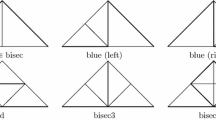Summary.
Adaptive Finite Element Methods for numerically solving elliptic equations are used often in practice. Only recently [12], [17] have these methods been shown to converge. However, this convergence analysis says nothing about the rates of convergence of these methods and therefore does, in principle, not guarantee yet any numerical advantages of adaptive strategies versus non-adaptive strategies. The present paper modifies the adaptive method of Morin, Nochetto, and Siebert [17] for solving the Laplace equation with piecewise linear elements on domains in ℝ2 by adding a coarsening step and proves that this new method has certain optimal convergence rates in the energy norm (which is equivalent to the H 1 norm). Namely, it is shown that whenever s>0 and the solution u is such that for each n≥1, it can be approximated to accuracy O(n −s) in the energy norm by a continuous, piecewise linear function on a triangulation with n cells (using complete knowledge of u), then the adaptive algorithm constructs an approximation of the same type with the same asymptotic accuracy while using only information gained during the computational process. Moreover, the number of arithmetic computations in the proposed method is also of order O(n) for each n≥1. The construction and analysis of this adaptive method relies on the theory of nonlinear approximation.
Similar content being viewed by others
References
Bergh, J., Löfström, J.: Interpolation Spaces. An Introduction, Springer, 1976
Binev, P., DeVore, R.: Fast computation in tree approximation. Numer. Math., this issue
Binev, P., Dahmen, W., DeVore, R., Petrushev, P.: Approximation classes for adaptive methods. Serdica Math. J. 28, 391–416 (2002)
Babuška, I., Vogelius, M.: Feedback and adaptive finite element solution of one dimensional boundary value problems. Numer. Math. 44, 75–102 (1984)
Babuška, I., Miller, A.: A feedback finite element method with a posteriori error estimations: Part I. The finite element method and some basic properties of the a posteriori error estimator. Comput. Methods Appl. Mech. Engrg. 61, 1–40 (1987)
Cohen, A., Dahmen, W., DeVore, R.: Adaptive wavelet methods for elliptic operator equations - convergence rates. Math. Comp 70, 27–75 (2001)
Cohen, A., Dahmen, W., DeVore, R.: Adaptive wavelet methods II – beyond the elliptic case. Foundations of Comp. Math. 2, 203–245 (2002)
DeVore, R., Sharpley, R.: Besov spaces on domains in ℝd. TAMS 335, 843–864 (1993)
Dahlke, S.: Besov regularity for elliptic boundary value problems on polygonal domains. Appl. Math. Lett. 12, 31–36 (1999)
Dahlke, S., DeVore, R.: Besov regularity for elliptic boundary value problems. Comm. Partial Differential Equations. 22, 1–16 (1997)
Dahmen, W., Kunoth, A.: Multilevel preconditioning. Numer. Math. 63, 315–344 (1992)
Dörfler, W.: A convergent adaptive algorithm for Poisson’s equation. SIAM J. Numer. Anal. 33, 1106–1124 (1996)
Griebel, M., Oswald, P.: Remarks on the abstract theory of additive and multiplicative Schwarz algorithms. Numer. Math. 70, 163–180 (1995)
Karaivanov, B., Petrushev, P.: Nonlinear piecewise polynomial approximation beyond Besov spaces. Appl. Comput. Harmon. Anal. 15, 177–223 (2003)
Lov’ asz, L., Plummer, M.D.: Matching Theory. Akad’ emiai Kiad’ o, Budapest, 1986
Mitchell, W.F.: A comparison of adaptive refinement techniques for elliptic problems. ACM Transaction on Math. Software 15, 326–347 (1989)
Morin, P., Nochetto, R., Siebert, K.: Data Oscillation and Convergence of Adaptive FEM. SIAM J. Numer. Anal. 38, 466–488 (2000)
Oswald, P.: Multilevel Finite Element Approximations. Teubner Skripten zur Numerik, Teubner-Verlag, Stuttgart, 1994
Papadimitrious, C., Steiglitz, K.: Combinatorial Optimization: Algorithms and Complexity. Englewood Cliffs, New Jersey, Prentice Hall, 1982.
Petersen, J.: Die Theorie der regulären Graphen. Acta Math 15, 193–220 (1891)
Triebel, H.: Interpolation Theory, Function Spaces, and Differential Operators, Amsterdam, North–Holland, 1978
Verfürth, R.: A Review of A Posteriori Error Estimation and Adaptive Mesh-Refinement Techniques. Chichester, Wiley–Teubner, 1996
Author information
Authors and Affiliations
Corresponding author
Additional information
Mathematics Subject Clasification (2000): 65N30, 65Y20, 65N12, 65N50, 68W40, 68W25.
This work has been supported by the Office of Naval Research Contract Nr. N00014-03-10051, the Army Research Office Contract Nr. DAAD 19-02-1-0028, the National Science Foundation Grants DMS 0221642, DMS 9872890 the Deutsche Forschungsgemeinschaft grant SFB 401, the European Community’s Human Potential Programme under Contract HPRN-CT-2002-00286, ‘‘Breaking Complexity’’.
Rights and permissions
About this article
Cite this article
Binev, P., Dahmen, W. & DeVore, R. Adaptive Finite Element Methods with convergence rates. Numer. Math. 97, 219–268 (2004). https://doi.org/10.1007/s00211-003-0492-7
Received:
Revised:
Published:
Issue Date:
DOI: https://doi.org/10.1007/s00211-003-0492-7




